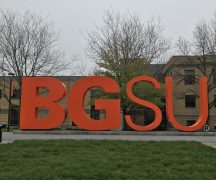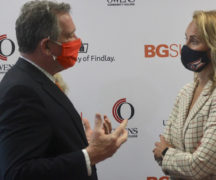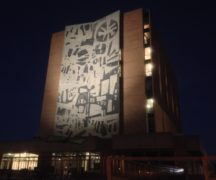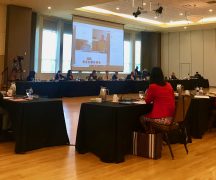By DAVID DUPONT
BG Independent News
On the Friday in advance of the 15th anniversary of 9/11 attacks, students from Bowling Green State University shared what they had learned about how others viewed this defining act of terrorism.
And the symposium Global Responses to 9/11 and the War on Terror: Literary, Media, and Film perspectives proved such a success that the organizers are considering whether this should be an annual event.
The symposium grew out of Khani Begum’s graduate course of the same name offered in spring, 2015. The 18 students, who represented a variety of academic disciplines including English, Literary and Textual Analysis, Creative Writing, American Culture Studies and Pop Culture, wrote papers of such distinction that late in the semester Begum mused that it was too bad they couldn’t present them as a group in a conference.
Sarah Worman and Elena Aponte, members of ATLAS, an organization of students studying Literary and Textual Analysis, discussed the idea, and decided the organization would take on organizing the event.
Begum and the graduate students decided to open symposium up to others who may want to present papers or organize panels. All it meant was working over the summer.
Worman said the symposium was well attended with the keynote address by Jeffrey Brown, professor in the Pop Culture Department, on “Rewriting 9/11: Superheroes and the Remasculinization of America” drawing the largest audience.
Begum had asked Brown to present the talk after hearing him give a class on the topic during last spring’s alumni college.
More than a dozen other faculty members also volunteered to present papers or participate in panel discussions.
The subjects ranged from a panel of Muslim women talking about their experiences wearing the veil while living in American to a discussion of stand-up comedians’ handling of the tragedy. There were presentations about news coverage, rap music’s response, the impact on children, and the many films and television shows addressing the attack and its aftermath.
Worman’s paper contrasted two cinematic looks at terror mastermind Osama Bin Laden. One was the American movie “Zero Dark Thirty,” and the other was the Bollywood film “Tere Bin Laden.”
The American action-thriller, directed by Kathryn Bigelow, had revenge at its core, she said. The Indian film, however, took a comic approach.
It was about a Pakistani reporter who wants to move to America. He thinks if he can peddle a film about an exclusive interview with Bin Laden he will garner enough media attention to get a visa. Except, there was no interview. It’s all a hoax. The man in the fake documentary who plays Bin Laden doesn’t even know he’s playing a part. He doesn’t even speak Arabic. He’s just reading from a script he doesn’t understand. He thinks he’s talking about chickens.
Speaking of the filmmaker Abhishek Sharma’s comedic approach, Worman said: “It definitely went out there.”
The film shows the diversity of responses of filmmakers and others in various countries, Begum said.
One British documentary, Begum said, “looked at the cell that carried out the attack. It was trying to get at what made them do this.”
The film, she said, was criticized by those who felt it offered too favorable a view of the terrorists. But Begum sees it as a way of trying to understand the tragedy “rather than just to say we’re going to war.”





